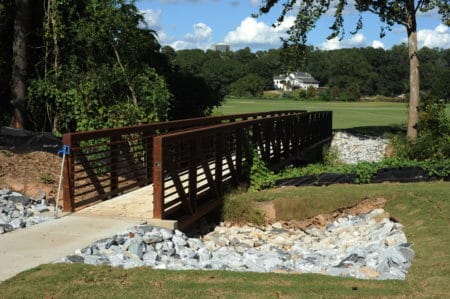After years of planning, neighborhood debates and massive real estate deals, it’s time once again to play at Bobby Jones Golf Course. Atlanta’s first public golf course, dating to 1932, reopens Nov. 5 with a dramatic redesign pitched as “revolutionary and spectacular.”
The $23 million remake of Bobby Jones, located off Northside Drive in Buckhead’s Atlanta Memorial Park, includes a total reconstruction of the course. Instead of the previous 18 holes, it’s now a “reversible” nine-hole course that golfers can play in two directions. The brainchild of the late famed designer Bob Cupp, it’s one of only two reversible courses in the nation. And that’s just one of many big changes, from a rebuilt tennis center to the inclusion of a state golf hall of fame.

Standing on a manicured green during a recent preview tour, General Manager Brian Conley said he’s seen quite a few courses in his time — including the championship set-up at Lanier Golf Club, which he formerly ran — but nothing like the new Bobby Jones.
“This really doesn’t compare with anything,” he said.
Marty Elgison has been working on Bobby Jones improvements for at least seven years, at first as a member of the Atlanta Memorial Park Conservancy. Now he’s head of the Bobby Jones Golf Course Foundation, a private group overseeing the reconstruction on behalf of the state, which now owns the course.
Piloting a golf cart over the course’s rolling landscape during the tour, Elgison emphasized the intent to make it a welcoming and accessible public course, not just a “revolutionary” experience for pros. One of the simplest features is a lack of roughs.
“One of the things we want to encourage is to play fast and have fun,” said Elgison.
The tees will be gender-neutral, ranked by a numerical skill level rather than “men’s” and “women’s,” and were designed as accessible to people with disabilities under advisement from Buckhead’s Shepherd Center rehabilitation hospital.
The city’s only public driving range is part of the project. Youth golf is important, too, with Bobby Jones serving as North Atlanta High’s home course.
The redesign includes an instructional “short course” for kids to “grow the game,” Elgison said.
But, for all those appeals to the public interest, not all members of the public were on board with remaking Bobby Jones, especially as the plans shifted over the years from minor upgrades to the massive reconstruction, which has closed the course for the past year. Also unsettling to many was an ownership change, as the city of Atlanta handed over the course to the state in exchange for some downtown properties around Underground Atlanta.
The foundation recently avoided possible legal action from a conservation advocacy group by agreeing to save and plant more trees, and is facing a pending lawsuit from a group of neighbors concerned about tree loss, traffic and other impacts. More general criticism has centered on expansion elements, including a large new clubhouse — it won’t open until sometime next year — that will house the hall of fame, offices for state golf associations, and a bar and grill called the Tenth Hole.
Elgison says that massive change was needed to make the course safe and usable, and to live up to the legacy of its namesake, a top pro of the 1920s and longtime Buckhead resident who founded the Augusta National course and co-founded the Masters Tournament.
The big challenge, Elgison said, was that the course sits on 128 acres instead of the 18-hole standard of 250. The course was still popular — workers dug up 1,400 lost balls during reconstruction — but its squeezed-in nature created some problems. One was safety: balls flying at other golfers from blind angles, among other issues, Elgison said.
So Bob Cupp, a Brookhaven resident who was one of the world’s top course architects, proposed the reversible course as a way to get 18 holes for the space of nine. He died during the design process and his son Bobby finished the job.
It’s an unusual set-up. Elgison discussed it while trying out a putt on one of the oversized greens, each of which has two holes.
“I was as confused as anybody” when he first played the course, Elgison said, but he got used to it. Players will be able to use tablet computers programmed with an interactive course map to help them figure it out, too, he said.
Some other changes aren’t as big as they seem, Elgison said. The “golf hall of fame” really will be more of a memorabilia room rented out for events, not a tourist destination, he said.

Other changes don’t directly involve golf, but are part of the rapidly changing landscaping. A redesigned Bitsy Grant Tennis Center next door was part of the project and opened in August with some courts atop a new, free parking deck. A new PATH Foundation multiuse trail, which is part of a connection to the Atlanta BeltLine, recently opened alongside the course.
As a public course, Bobby Jones will be open seven days a week and likely 365 days a year. The initial pricing for an 18-hole round is $45 to $85, Elgison said, a rate that may be adjusted depending on public reaction. After a private soft opening for special donors, the course is expected to open to the public Nov. 5. For more information, see bobbyjonesgc.com.




